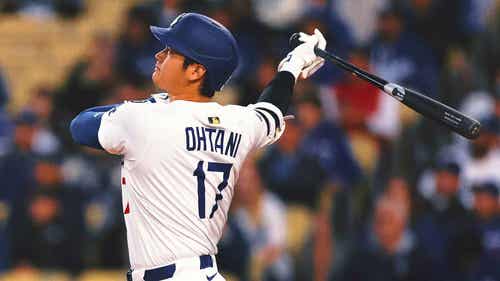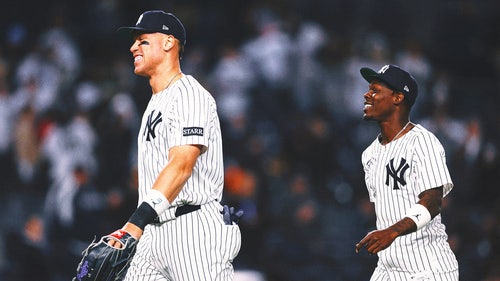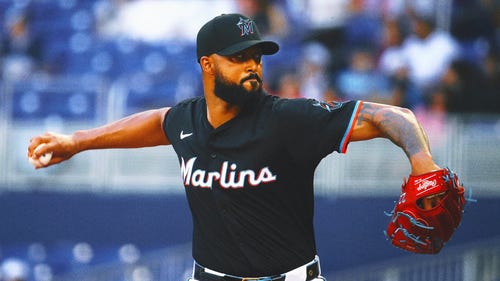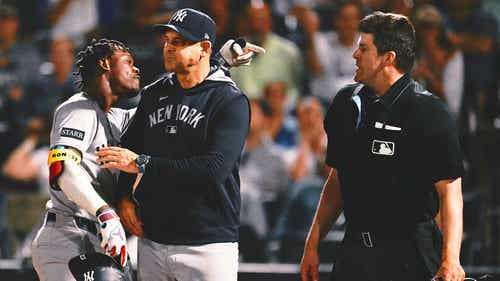
Braves roundtable: Evaluating team's performance at quarter mark
FOX Sports South Braves writers Cory McCartney, Zach Dillard and Jay Clemons weigh in on some pertinent questions about the season to date and what's to come (all stats updated through May 14):
MCCARTNEY: Designated as the face of the franchise with his monster eight-year contract extension on the heels of his first All-Star Game nod, Freddie Freeman continues to be the most consistent force in the Braves lineup. He's hitting .307/.379./520 with 151 wRC+, second-highest among all first basemen, and is third at the position in offensive WAR (8.6).
But where Freeman's value is most evident with the Braves is in being a counter to the team's biggest deficiencies: strikeouts and hitting with runners in scoring position.
Freeman's K rate of 14.8 through 169 plate appearances is the lowest of his career (and second only to Andrelton Simmons' rate of 8.0 among Braves) and he's Atlanta's only everyday player hitting above .286 with RISP, boasting a .382 average.
While Justin Upton, who has a higher offensive WAR than Freeman at 8.8, delivered another strong start to the season, we've seen him drop off before. There's a much smaller chance we see an elongated slump out of Freeman, who has gone hitless in more than three straight games just once since last season's All-Star break.
DILLARD: The understated fact of the matter is, despite the offensive prowess of Freeman and Justin Upton this season, right fielder Jason Heyward leads the team in value -- ranking first in wins above replacement, according to both FanGraphs (1.5) and Baseball Reference (1.7). That's a sweeping appreciation of his defensive work, as he still leads all MLB players with a 15 defensive runs saved at a premium position. However, given the Braves struggles offensively and the pitching staff's numbers (some of which have been bolstered by Heyward's defense), it's difficult to choose a .205/.304/.315 leadoff hitter here. Heyward may end up on top of this list by the end of the season, but for now I'll go with Justin Upton.
Freeman carries the slight edge offensively, but Upton has been the better all-around player for this team and his importance in this offense is at least partially reflected in his move to No. 2 in the order earlier this month. Upton is hitting .279/.361/.537 with nine home runs and 1.4 WAR, ranking first or second on the team in practically every offensive category. And though Freeman leads the team with runners in scoring position, Upton has out-performed him in high- and medium-leverage situations this season -- meaning in the most important situations in the game, Upton has delivered. Only catcher Evan Gattis has done better in those situations, and his overall numbers aren't quite on par with Upton's.
We saw a similar storyline play out last season, where Upton built up his stats during a scintillating April only to cool off in May. Thus far, that's been the case. He's hitting .182/.280/.318 with only one home run this month and, as far as typical starters are concerned, only Dan Uggla has provided less value. With that being said, if this question concerns who has been the most important player to date -- not who will be the most important player for the rest of the season (because I'd probably choose Heyward) -- and Upton makes for a pretty good case.
CLEMONS: At first blush, I drew the short straw with this three-way debate, not getting the chance to tout Freeman or Upton as the most important Braves player. But I'm certainly content with my choice of starting pitcher Ervin Santana.
In his six starts with Atlanta, Santana has been an invaluable, near-unstoppable gem for the club, racking up a 4-0 record, 1.99 ERA, 1.01 WHIP and 43/9 K-BB rate.
Of equal importance, Santana's greatness, for the most part, occurred at a time when the Braves were waiting for Mike Minor (offseason surgery) to rejoin a rotation that has undergone substantive changes since mid-February (no Kris Medlen, Brandon Beachy or Freddy Garcia -- for various reasons).
In his first season with a National League team, the 10-year veteran has gone at least six innings in every start; and of his six outings, Santana has fanned six or more hitters five times, including his 11-strikeout demolition of the Phillies on April 14.
From an efficiency standpoint, Santana (109 wins, 4.14 career ERA) has also eclipsed the 100-pitch count just once this season, meaning he should be fresh (and perhaps dominant) for the next 23 or 24 starts, barring injury. That efficiency was never more prevalent than Santana's Braves debut against the Mets on April 9, tossing strikes for his first 20 pitches ... before posting eight scoreless innings on just 88 pitches.
DILLARD: While the three of us try to give a variety of answers here, this one practically answers itself. Look at 2014 salary, look at recent track record, look at the path to Atlanta ... whatever you choose to look at, Aaron Harang has been an absolute revelation for general manager Frank Wren and the front office. And while the Indians, who released Harang during spring training when he did not make their rotation, are doing just fine without him (second in team pitching WAR), the Braves scouts responsible for pinpointing that there was still something in the Harang's tank deserve some end-of-season bonuses.
With the highest strikeout rate among Braves starters, Harang leads all Atlanta pitchers with 1.2 WAR. Though his ERA has "spiked" over his past three starts to 2.98, he's still proven himself to be a valuable commodity and he's apparently earned manager Fredi Gonzalez's trust. There are only two Braves pitchers ranked among the league's top 30 pitchers in WAR (Harang, Santana), and one of them is coming off an underwhelming 2013 season and playing on a $1 million contract.
CLEMONS: Alex Wood actually has a higher ERA (3.26) this season than his rookie campaign (3.13), but that's a trivial matter when grasping the breadth of the kid's versatile production as both starter and reliever.
Wood's initial seven appearances came as a stater, when he allowed just one or two earned runs six times and notched seven-plus strikeouts four times. As such, if Wood had been with any other franchise -- including the 24-12 Tigers (baseball's best team) -- he might have already clinched a yearlong spot in the rotation. Instead, Wood's noble efforts were, uh, rewarded with a new role in the Braves bullpen, the dual result of Atlanta having the lowest starters' ERA in the majors (2.64) and the club possessing an over-abundance of quality veteran arms -- thanks to the acquisitions of Santana, Harang and Gavin Floyd.
Wood has also been hindered by three ancillary factors: age (23), salary ($506,000) and the audible whispers of the Braves capping the young southpaw's seasonal output at 160-175 innings (neighborhood estimate).
MCCARTNEY: Harang's resurgence has been unexpected, especially after joining the team days before the regular season started. But it's the way Santana has performed after betting on himself that's been a bigger surprise.
Inking a one-year, $14.1 million contract, and declining three-year offers from others, Santana is putting together a first half of the season that's well above his career average of a 4.36 ERA, as the ERA leader (1.99) on a rotation with the majors' lowest ERA (2.64).
He's now 4-0 with a .221 batting average against over 40 2/3 innings and that ERA is the third-lowest in baseball. But most remarkable for a guy that two years ago gave up a MLB-high 39 home runs and has a career rate of 1.20 per nine innings, is that he's allowed just two so far, a rate of 0.44 per nine. Much of his success could be attributed to a change of scenery as he's throwing in the NL for the first time after nine seasons in the American League, and as teams get more looks at him, he could decline.
Regardless, after the season-ending surgeries of Beachy and Medlen, the Braves needed Santana to prove his comeback year in Kansas City in '13 wasn't a fluke and he's been more dominant -- and consistent -- than anyone could have predicted.
CLEMONS: I would have lost a ton of money in Vegas, prior to the season, betting Atlanta's offense would hold a worse MLB ranking with on-base percentage than total strikeouts.
In the old days of Braves baseball -- like 2012 -- the club had the reputation of being reasonably proficient with OBP (.320 range), while ranking among baseball's best home run producers. Amazingly, though, the 2014 Braves stand at 29th in OBP (.290) and just 26th in total strikeouts (349) -- a galling figure for a franchise that harbors genuine World Series aspirations.
Speaking of the Fall Classic, in the last 20 years, no MLB team has won a championship with an OBP of .320 or less; and in that span, only the 1995 Braves had a bottom-five OBP ranking in the majors (.326).
Strangely, the apparent demotion of Uggla (just three homers since July 26) has had a cancel-out effect with Atlanta's OBP and strikeout tallies. Yes, his .183 batting average and .246 OBP are well below average, but he's also on pace for fewer than 150 strikeouts -- an adjusted figure in the wake of him logging zero starts since May 7.
MCCARTNEY: As previously spelled out, Freeman is the Braves' only player hitting above .286 with RISP, a sore subject for an offense that's 29th overall at 3.23 runs per game. But it continues to be the team's biggest problem area.
Atlanta is hitting .231 as a team with RISP (22nd) and in those situations is dead last with 82 RBI and has the sixth-highest strikeout rate (23.5). The Braves have the ability to improve here because when they are putting the ball in play, good things are happening, with three regulars (Freeman, Gattis and Chris Johnson) all with BABIP of .333 or better with RISP.
Considering the overall strikeout rate isn't going to decline -- remember, the last three seasons Atlanta has set franchise records for Ks and is on pace for 1,448, which would surpass last year's 1,384 -- there may not be an overall jump in average with RISP, but the Braves do have players that are showing they can take advantage. That's at least a foundation to work with.
DILLARD: Playing off the on-base percentage point, this Braves offense simply does not walk enough to feature an acceptable on-base percentage. This is the franchise's lowest walk rate (7.2 percent) since its awful 1988 campaign. Four Atlanta hitters who have received at least 100 plate appearances have logged a walk rate under 6 percent -- Uggla, Gattis, Simmons and Johnson -- while bench options Jordan Schafer and Ryan Doumit certainly are not helping matters.
As mentioned above, the Braves offset their franchise record strikeout numbers last season by boasting the sixth-best walk rate (not to mention better power numbers), so if this offense is going to get back on track, expect some improvement in the base-on-balls department. Those strikeouts, on the other hand, likely aren't going anywhere.
MCCARTNEY: June 9-15 includes a four-game set against the Rockies on the road, then a trip home to face the Angels for three, a daunting back-to-back. That's the majors' most potent offense in Colorado, which is scoring 5.5 per and hitting .296, both MLB bests, and the Halos who are second in runs per (5.03).
The first-half schedule has more daunting weeks based on opposing schedules, with the May 19-25 run including the Brewers (25-15) and Rockies (23-19), but those games are all at home. That mid-June run is currently the only such period on the Braves' schedule in which they'll play a team above .500 for an extended period of time away from Turner Field.
DILLARD: This 20-game stretch the Braves are in right now is crucial. For four straight series, they play four of the top seven or eight teams in the National League. Then they play the defending champion Boston Red Sox in a home-and-home series before taking on the Marlins down in Miami (a task that is now less daunting following the unfortunate news of Jose Fernandez's season-ending injury).
A pivotal week during that stretch? The road games against the Giants and Cardinals will be difficult, and the Braves will need to get back on their feet when they welcome two top-tier clubs to Turner Field from May 19-25. The Rockies and their offensive prowess have already been covered here. But then there's a four-game series against the NL Central-leading Milwaukee Brewers, who boast one of the most balanced teams in baseball. (There's also noted Braves nemesis Carlos Gomez to reckon with.) If Atlanta can hold onto one of the top spots in the NL East during this difficult stretch, the schedule eases off in a major way come late June and throughout July.
CLEMONS: On paper, the Braves will be expected to collect at least six wins from this eight-game, eight-day stretch against the Diamondbacks (home), Mets (road) and Cubs (road) which immediately precedes the All-Star break.
The rewards don't end there: After the break, the Braves will encounter a juicy 11-game homestand against the Phillies, Marlins and Padres. (Hopefully by then, Atlanta will have more clarity with its starting rotation.)
All told, this eminently doable swing (19 games) represents a golden opportunity for the Braves to separate themselves from the pack in the National League East -- a division race that currently doesn't include Miami's Fernandez (season-ending elbow injury) or Nationals outfielder Bryce Harper (broken thumb).
For good measure, the 21-19 Nationals (1.5 back in the NL East) have only four home outings from July 9-30.
CLEMONS: Without fail, a starting pitcher gets snubbed during the All-Star selection process -- typically the consequence of each MLB club needing at least one representative for the Midsummer Classic.
As such, I have an ominous feeling that Julio Teheran (2-3, 2.20 ERA, 0.96 WHIP, 46/16 K-BB rate) won't be making the trip to Minneapolis in July, given his age (23), relative inexperience (43 starts) and lack of name-brand recognition outside the state of Georgia. Is there a more underrated ace on a winning club than Teheran? Prior to Wednesday's rough outing in San Francisco, the Braves right-hander had tallied eight consecutive starts of allowing three runs or fewer.
On a happier note, Freeman (seven homers, 24 RBI, 23 runs, .307 batting, .379 OBP), Santana and Craig Kimbrel (2.51 ERA, 10 saves) are cruising toward All-Star invites; and Justin Upton (nine homers) has a chance to make the club, as well, provided he's not primed for a sustained May or June swoon.
MCCARTNEY: Freeman and Kimbrel, both All-Stars last season, are all but locks to make another appearance. But they shouldn't be the only Braves in Minnesota come July 15.
Santana's 1.99 ERA trails only the Reds' Johnny Cueto (1.43) and Cubs' Jeff Samardzija (1.45) among NL starters and he's the active leader in fielding independent pitching (2.30) with the overall leader, Fernandez (2.16), now out for the season. If the Braves' rotation is going to be honored for its unexpected early dominance, Santana would seem the most logical representative.
Meanwhile, Simmons' offensive is improving -- he's hitting .260/.283/.420 -- and has the lowest strikeout rate of any shortstop, but he's eighth in the NL at the position in offensive WAR (minus-2.8).
Still, he's an All-Star based on his defensive work. While it hasn't been as statistically staggering as it was a year ago when he had a 31.6 defensive WAR, but plays like this throw off his backside are reminders of his Platinum Glove resume, which may be enough to get him a reserve spot.
DILLARD: Freeman and Kimbrel indeed look like locks at this point. There are two other first baseman in the National League who compare to Freeman at the moment, and their names are Joey Votto and Paul Goldschmidt. In other words, All-Star company to keep. Kimbrel's reputation is spotless, and despite pitching just 14 1/3 innings this season due to his shoulder, his numbers are about as good as ever. He ranks fourth among all relievers in WAR despite that limited workload, and he's striking out a career-high 17.58 batters per nine innings. Do you understand how hard it is for Craig Kimbrel to set career highs in strikeout-related categories? He's in, by a mile.
Santana and Justin Upton are interesting cases.
Santana may not be a lock just yet -- and though Fernandez is out of the picture, Stephen Strasburg, Cliff Lee, Adam Wainwright and Clayton Kershaw will probably take away some spots -- but the third-best starters ERA in baseball and the top active starters FIP will certainly not dimish his odds if he can keep it up through his next seven or eight starts. There's also his 4-0 record, which has never hurt anybody in this process. Upton, on the other hand, faces an even steeper climb. Though his current numbers are right on the brink of "All-Star quality," the competition in the NL's outfield is going to be ridiculous: Giancarlo Stanton (Marlins), Yasiel Puig (Dodgers), Andrew McCutchen (Pirates), Carlos Gomez (Brewers) and Charlie Blackmon (Rockies) are tearing the cover off the ball, while Seth Smith could very well end up as the Padres' lone representative.
It's not an easy road to the All-Star outfield, and Upton will first need to shake off a poor May start.





